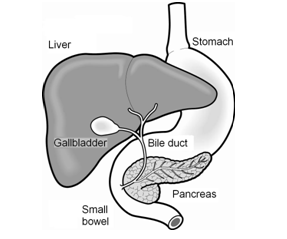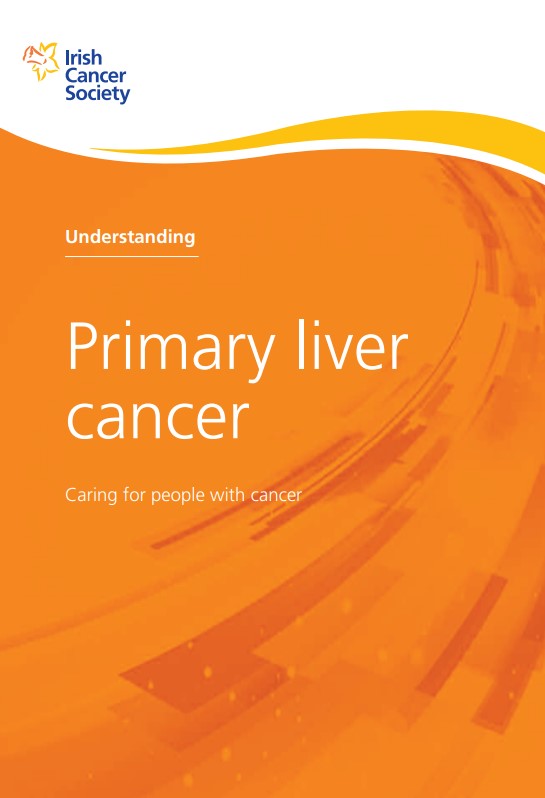Liver cancer
Around 300 people are diagnosed with liver cancer each year in Ireland. It is twice as common in men than in women.*
Signs and symptoms
Learn about the signs and symptoms of liver cancer. You are more likely to survive cancer if you find it at an earlier stage.
Treatments
There are a number of different treatments available for liver cancer. Your medical team will explain the best treatment options for you.
What is primary liver cancer?
Primary liver cancer is a cancer that starts when liver cells change and grow in an abnormal way to form a group of cells called a tumour.
The main type of liver cancer is hepatocellular carcinoma (HCC). This is cancer that develops in the main liver cells called hepatocytes. HCC accounts for about 8 in 10 primary liver cancers.
Cholangiocarcinoma (bile duct cancer) is a less common type of primary liver cancer. It occurs in the small, tube-like bile ducts within the liver that carry bile to the gallbladder. Cholangiocarcinomas account for 1 in 10 primary liver cancers. Intrahepatic bile duct cancer begins in ducts located in the liver. Extrahepatic bile duct cancer develops in ducts outside the liver.
Around 300 people are diagnosed with liver cancer each year in Ireland.*
What is metastatic (secondary) cancer in the liver?
Sometimes other cancers spread to the liver. This is called secondary liver cancer (metastatic cancer). For example, bowel (colorectal) cancer cells can spread to the liver. The cancer cells are not liver cancer cells. So, for example, when bowel cancer spreads to the liver the cancer cells are bowel cancer cells and are treated with bowel cancer treatments, even though they are in the liver.
Metastatic cancer in the liver (secondary liver cancer) is a lot more common than primary liver cancer.
The information in these pages is about primary liver cancer.
What is the liver and what does it do?
The liver is the largest organ inside the body. It has two lobes: a right and left lobe. It is on the upper right side of the abdomen, under your rib cage.

- It makes proteins that help blood to clot, preventing bleeding.
- It makes other proteins (albumin) needed for fluid balance in your body.
- It plays an important role in the body's ability to fight infection.
- It makes cholesterol, needed for every cell in your body to grow.
- It stores and converts carbohydrates and fats into energy.
- It makes bile that breaks down fats and absorbs them into the body.
- It stores glucose and nutrients until the body needs them.
- It gets rid of substances not needed by your body. These include alcohol, drugs and other waste products.
What increases my risk of liver cancer?
The cause of liver cancer is unknown. But there are risk factors that can increase your chance of developing the disease. These include:
Infections such as hepatitis B and C can lead to liver cancer.
Smoking increases your risk of getting liver cancer - if you smoke and also have hepatitis B or C your risk is even higher.
Liver cirrhosis is scarring of the liver. In Ireland, cirrhosis is mainly caused by alcohol misuse over many years, non-fatty liver disease (associated with obesity and type 2 diabetes) and hepatitis C or hepatitis B. A small number of people who have liver cirrhosis develop liver cancer.
If you have an inherited condition like genetic haemochromatosis (this causes higher than normal levels of iron in your body), auto immune hepatitis or primary biliary cirrhosis you have a higher risk of developing liver cancer.
Liver cancer is more common in older people, especially if you have liver cirrhosis.
Liver cancer is twice as common in men as it is in women.
Your risk of liver cancer increases if you are overweight and have diabetes.
Having a risk factor doesn’t mean you will get cancer. Sometimes people with no risk factors get the disease. If you’re worried, talk to your GP or talk to one of our cancer nurses. Call our Support Line on 1800 200 700 or visit a Daffodil Centre.
Reducing your risk of liver cancer
Things you can do to reduce your risk of liver cancer include:
- Keep a healthy weight for your height
- Don't smoke
- Stay within the low-risk guidelines for alcohol
- Ask your GP about monitoring / surveillance if you have a disease of the liver
Medical content reviewed by Associate Professor Ross MacNicholas, Consultant Gastroenterologist and Hepatologist; Associate Professor Emir Hoti, Consultant Hepatobiliary and Transplant Surgeon; Michèle Bourke, Hepatocellular Carcinoma Advanced Nurse Practitioner (2023).
Continue reading about primary liver cancer
Talk to a Cancer Nurse

Support Line
Our Daffodil Centres

*The Irish Cancer Society uses the most up-to-date cancer statistics from the National Cancer Registry Ireland, available on www.ncri.ie

